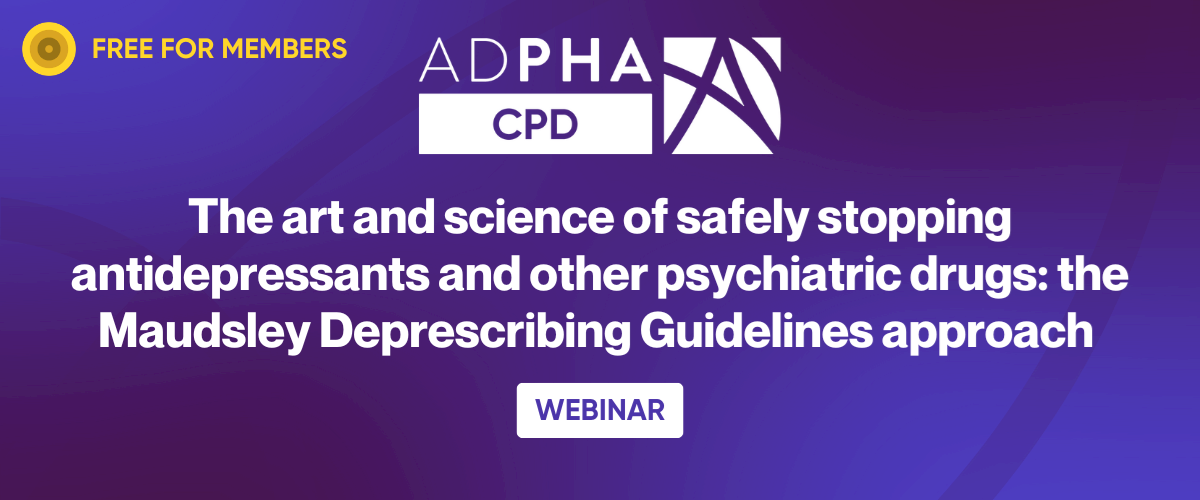


How to safely stop psychiatric drugs has been relatively neglected in psychiatric teaching and guidelines. An attempt to fill this gap has been with the Maudsley Deprescribing Guidelines. The major risks on stopping medication are relapse and withdrawal effects. Withdrawal effects from antidepressants are more common, severe and long-lasting than previously recognised. Protracted withdrawal syndromes occur in some people who have stopped psychiatric medications and can be debilitating. Taking antidepressants as an example, withdrawal effects can manifest as both psychological and physical symptoms. Poor recognition of these effects can lead to mis-diagnosis as relapse of an underlying condition or onset of a new physical or mental health condition. Tips are provided to distinguish these conditions from withdrawal effects.
Safely stopping antidepressants and other psychiatric drugs after long-term use in people who have difficulties involves three principles:
As the relationship between dose of psychiatric drug and effect on target receptors is hyperbolic (mirrored in clinical effects) it is pharmacologically rational to reduce dose in a hyperbolic manner to produce linear changes in effect on target receptors. This necessitates making reductions by smaller and smaller amounts down to very low final doses before stopping for those with difficulties. The doses required are smaller than widely available tablets and so liquid versions of medications or compounded smaller doses may be required. The rate of taper should be adjusted to the individual’s ability to tolerate it. It is notable that patient-led groups have developed identical guidance through trial and error.
The Maudsley Deprescribing Guidelines provides fast, moderate and slow reduction regimens for all licensed antidepressants, benzodiazepines, gabapentinoids and z-drugs, as well as guidance on which formulations of medication are suitable for this approach, including ‘off-label’ options where relevant. It is hoped that this guidance will help prevent some of the difficulties patients have when stopping medication and thus enable rationalisation of medication regimens.
This webinar will cover the following learning objectives:
|
Members
|
Non-members
|
|
|
Registration price
|
FREE
|
$50 incl GST
|
Dr Mark Horowitz, Clinical Research Fellow - Psychiatry, NHS; Visiting Lecturer in Psychopharmacology, King's College London

Dr Mark Horowitz MBBS PhD is Clinical Research Fellow in Psychiatry in the National Health Service (NHS) in England, Visiting Lecturer in Psychopharmacology at King’s College London, and a trainee psychiatrist. He has a PhD from the Institute of Psychiatry, Psychology and Neuroscience at King’s College London in the neurobiology of depression and antidepressant action. He is the lead author of the Maudsley Deprescribing Guidelines, which provides the basis for national guidance in the UK from the NHS for prescribers on how to safely stop psychiatric drugs and has been endorsed by the College of General Practice in Australia, and the Royal Pharmaceutical Society in the UK.
He co-authored the recent Royal College of Psychiatrists’ guidance on ‘Stopping Antidepressants’, and his work informed the recent NICE guidelines on safe tapering of psychiatric medications, including antidepressants, benzodiazepines and z-drugs. He has worked with the NHS to develop national guidance for safe deprescribing for clinicians and has been commissioned by Health Education England to prepare a teaching module on how to safely stop antidepressants for the NHS.
He has written several papers about safe approaches to tapering psychiatric medications including publications in The Lancet Psychiatry, JAMA Psychiatry and Schizophrenia Bulletin. He is an Associate Editor of the journal Therapeutic Advances in Psychopharmacology. He has an interest in rational psychopharmacology and deprescribing psychiatric medication. He has experienced the difficulty of coming off psychiatric medications first hand which has informed much of his work.
This activity has been accredited for 0.75 hours of Group-2 CPD (or 1.5 CPD credits), suitable for inclusion in an individual pharmacist’s CPD plan.

The accreditation number is S2025/06.
The program addresses pharmacist competency standards, including:
*National competency standards framework for pharmacists in Australia, 2016
All registration rates include GST
AdPha are in no way responsible for any connectivity issues as a result of the participants internet connection or hardware issues or other external factors impacting the internet, that are out of AdPha's control.
The AdPha website contains guidelines, policies, procedures, information and various data which have been prepared by AdPha. Whilst the information contained on this site has been reviewed with due care, AdPha does not warrant or imply that the information is free from errors or omissions. Whilst the information is considered to be true and correct at the date of publication, changes in circumstances after publication may impact on the accuracy of the information.
The information presented on the website is made available on the understanding that AdPha, its employees and agents shall have no liability to the users for any loss, damage, cost or expenses arising from the use of the information through either action or inaction based on material on this site.
AdPha provides links from the AdPha website to sites that might be useful information sources to users of the website. Providing this information in no way assumes responsibility for the content contained on those websites.
| Members | |||
|---|---|---|---|
| AdPha Member |
AdPha Member Available Until 20/02/25 |
$0.00 | |
| Non-Members | |||
| Non-member |
Non-member Available Until 20/02/25 |
$50.00 | |